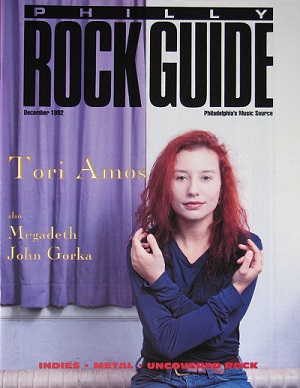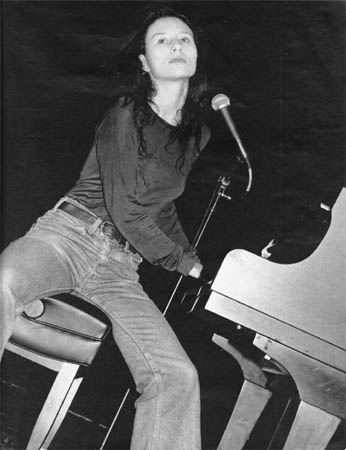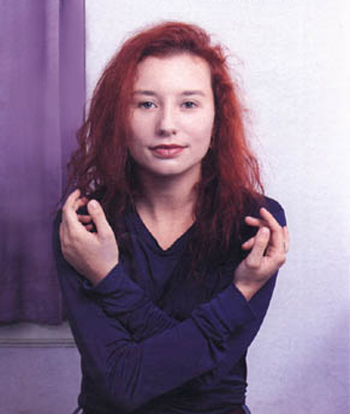|

songs | interviews | photos | tours | boots | press releases | timeline
Philly Rock Guide (US)
Philadelphia's Music Source
December 1992

tori amos
by Jay S. Jacobs
Photo by Stephanit E. Jennings
So, who is Tori Amos, anyway? Is she the shy daughter of a minister? The musical prodigy who felt like an outcast? A rock and roll bimbo? A weird chick who believes in fairies? A brutally frank singer and songwriter?
Tori has played all these roles in her life, and more. She's played piano for as long as she can remember. Amos recalls playing by ear at four, but her mother says she had the skill at two and a half.
"I was playing before I thought about there being any music world out there," Amos says. "All I knew was there was this massive black piano staring at me. I'd crawl up on the little stool and go, 'I love you. Can we be friends?'"
Her father was a Methodist minister--a strict upbringing that shaped her life. She loves her father but realizes his beliefs had a way of making her feel awkward as a child and creating guilt throughout her life.
During her late teens, her parents decided she'd be a classical pianist. Amos would lay in her dark room listening to Led Zeppelin II, planning how Robert Plant would take her virginity.
She played music through school and eventually formed a band called Y Kant Tori Read. The band released an album, but the record company pushed it to the wrong crowd. Y Kant Tori Read was touted as metal, but it was more of a pop/rock band. The marketing department put Amos into a tight spandex outfit, plastic snake pants and hair moussed to the ceiling, while she held a scimitar on the cover.
"I was a rock chick," Amos smiles. "I was in a band that was pretty progressive. We were never a metal band. It was just interesting and progressive music. It really could rock. People who got brought into the project didn't think what we were doing was working, although that got us signed. Disputes and arguments tore us to pieces. All that was left was me. This forced me to go back to my piano. All the time, if you would have had this conversation with me when that record was coming out, I would swear to you up and down that this is what it should be.
I wasn't able to say maybe some mistakes were being made. Maybe we were doing this for the wrong reasong."
Amos started writing with different people on what would become her breakthrough album, Little Earthquakes, an album that she didn't intend as a big hit. The new music only confused the executives at Atlantic, but she'd eventually hooked up with producer and former rock journalist Davitt Sigerson [The Bangles, David & David].
"I kept turning in these songs," Amos laughs. "They'd hear 'Leather' and go, 'You're out of your mind. We're not interested in this.' I said, well, this is what I'm doing. Eventually, after a few years, I finally hooked up with Davitt, who told everybody, 'You guys are missing the point. This is what she really does. It is what she's been doing since she was two years old.' And nobody knew."
The record company was still unsure about Little Earthquakes, so it released the album in England first. Atlantic figured the Brits were more open to different types of music. The critical and popular responses were great, so they sent it off to the States, and the album became a solid hit. The singles "Silent All These Years" and "Crucify" were all over college radio this year. The new single, "Winter," has just been released. And Amos was nominated for three MTV awards in 1992, including Best New Artist.
Tori is often painted as an off-the-wall interview. Not true. Her words are well-thought-out and interesting. She has a very active mind, She stops in the middle of an answer to say, "I hope you don't use exclamation points in this article, because I really hate them. I'm into periods."
It's part of her makeup. She likes to surprise people. Her lyrics often use unexpected non sequiters. In her songs she has the antichrist yelling in her kitchen, or she's dating a guy who dumps her because she eats the same kind of ice cream as Charles Manson, or she nearly runs over an angel who is toking on a big old cigar. Her words are provocative.
Her songs are a mixture of strength and insecurity. In "Precious Things," she can be powerful enough to tell a man, "So, you can make me come. That doesn't make you Jesus." In the same song she also admits vulnerability when she's told she's ugly by a man who seduces her, and she's shocked by her own reaction--thanking him.
"It's like when you have honey and garlic together," Amos explains. "When you have different spices that you wouldn't normally put together, they don't always work. But when they do work, they really work. It's the subtext. We're not one-dimensional people. We can hate something and at the same time be turned on. We can really be hurt by somebody and want to hit them, but if they would give us a hug, we would just hug them back."
Critics have championed her as the latest in the line of great female singer/songwriters that have come out steadily in recent years, such as Suzanne Vega, Sinead O'Connor and k.d. lang. The influence pointed to most for Amos is Kate Bush. She even acknowledged the similarity by posing for the cover of Little Earthquakes inside a wooden crate, as Bush did on the American cover of her first album, The Kick Inside. But in the end, this is all way too confining. Amos has a unique talent that cannot be explained by rote terms like "female singer/songwriter."
"I believe in balance," she says, "I believe you have to hear from the women. You have to hear from the men. You've got to hear from different cultures. This is how you get a perspective on things. We need it from all sides. That's how you get clarity. Everybody needs to be listening to a bit of all of it. If you cut yourself off from Ice Cube and Ice-T and all those guys, then you're going to cut yourself off from their perspective of what truth is. You cut yourself off from Pearl Jam and Nirvana and those guys, you're cutting yourself off. If you cut yourself off from Neneh Cherry or from me or from Sinead, then you're also closing yourself off."
At the time of this interview, Sinead O'Connor was very much in the news because of the incident on Saturday Night Live in which she tore up a photo of the Pope to protest policies of the Catholic church. As someone who has been very vocal about her own religious upbringing, Amos feels sympathy for O'Connor, although she believes O'Connor may not have considered the effects of her act.
"I don't think what Sinead was doing was hype. I think she really believed in what she did. I don't think she was aware of how it was going to be perceived. When you do something like that, you have to take responsibility for it. That's the main thing. You have to do it without being afraid of the consequences--and there are consequences. One of them has been that the Pope has been made a martyr, which is the last thing that was her intention. It's not just this one pope. This is about all of us dealing with responsibility. This is all of us dealing with suppression in ourselves of what we're really thinking and hiding behing any kind of institution--and how the institutions have to be held accountable.
"When you do something like that, what happens is you just become an extension of the institution, of what they've done for thousands of years. You don't mean to be. What happens when you're a dog pushed in the corner and you're hit so many times? You start biting back. Then what happens? They go shoot the dog. They don't say the master was beating the dog, just the dog bit somebody, shoot it. That's what has happened. You know what? She felt she needed to do that. You've got to honor that."
Amos is a minister's daughter whose words call p an entire set of concrete images. To the idealist, she's a pure woman who is comfortable with her god and only believes in sex for procreational purposes, assuming she decides not to become a nun or spinster. Reality is usually very different. Much of the time she will grow up rebellious, ponder her faith and go through experimental phases. Tori Amos knows this lifestyle well, because she's lived it.
"It's one thing to have tastes of it. It's another thing to be surrounded by it," Amos explains. "It's like when you get your head held under the water. When you're just dunked a couple of times, you don't really know what's down there, because you don't see it too much. But you know, God, I didn't like getting dunked. What's going on? You might not remember that has traumatized you. People who go to church once a year, they can't get to the root of it. I had my head held down for so long, I know exactly what's down there, how many sea horses there are, what's happening. It took me a while. The problem is I just stayed down there."
Amos reacted to the lifestyle with her music. Her albums and shows are very confessional, almost like therapy. She's not afraid to tell her audience about her views on sex, religion or her family relations. She's also not afraid to show that she is sometimes unsure about right and wrong. Her songs vary from the very seductive "Leather" to the a cappella "Me And A Gun," which is sung from the point of view of a woman as she is being raped. When talking to her audience, she can brazenly tell stories of masturbating as a child, and yet she sounds appealingly innocent when she tells of a new rock star hitting on her at the MTV awards in front of her parents.
She's not sure when she'll follow up Little Earthquakes. She has some ideas in her noodle, but nothing set. Amos is still proud of her accomplishments with the first album. "I didn't write one note or one word to please people," she says. "I didn't do something to have a hit record. I'm not seduced by the idea of a hit record. If it happens, it happens in its own time. I'm into making records that know who they are and make really clear choices."
 
[transcribed by jason/yessaid]
[thanks to richard handal for providing scans of this article]
t o r i p h o r i a
tori amos digital archive
yessaid.com
|